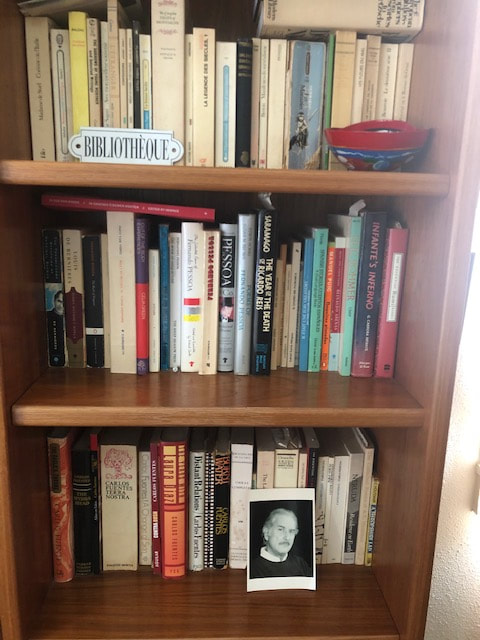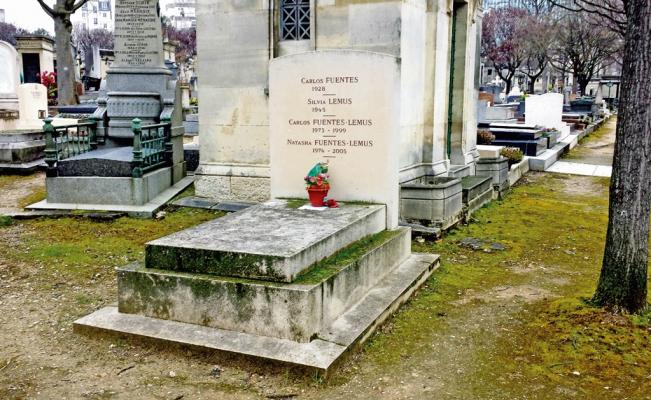Mexican, American, European—Man of the World! Carlos Fuentes.
By Christie Seeley
Vallartasounds.com
I love literature. Not just any writing, I have my heroes. The list does grow, but Carlos Fuentes always remains on the top. When he passed away in May of 2012, I felt a tremendous personal loss thinking I would never hear from him again. I was wrong because every time I pick up a novel, essay, or political piece written by him, he is there.
Back in the early '60s, my first husband, his brother, and wife and I embarked on a journey in their new Volkswagon bus through Mexico. We planned to spend the month before university resumed exploring the exotic locations we had read about in anthropology and history classes the year before. At the border, we met a couple of young men about our age who were to take a train to Mexico City. In chatting, we decided, as all of us were on tight budgets, they would ride with us as far as Mexico City, and share the cost of the gasoline. The two fellows were cousins from the East Coast. One of them was doing his Ph.D. at Harvard on Trotsky's life in Mexico. Tony had a fascinating story to tell about his upbringing in Cuernavaca with his fugitive family. His father, a screenwriter, had managed to get his family out of Hollywood just as the FBI was exerting its power during the infamous purge of so-called Communist writers, actors, and producers under the obsessed Senator Joseph McCarthy.
Before we headed south, Tony recommended I buy a copy of Carlos Fuentes' latest novel "The Death of Artemio Cruz," which had catapulted him to fame as "one of the most admired writers in the Spanish speaking world." The novel was superb. Following the ideological twists and turns of his life, Artemio Cruz, once a passionate revolutionary, narrates his, not always admirable, adventures in post-revolutionary Mexico from his deathbed while his family argues about inheritance.
The son of a diplomat, Fuentes, spent his childhood living in the various countries to which his father was assigned. His ability to view these cultures not only as a participant but also with an outsider's objectivity no doubt came from those beginnings. Educated in Mexico and the US, a country for which he held a great admiration except for its foreign policy, his understanding of both peoples equipped him to comment on subjects of significant interest in his many political articles.
Of Fuentes' novels, one of my favorites is Terra Nostra. This epic story takes us through centuries of development of Hispanic history from European monarchs to encounters with the jungles and indigenous people of Mexico and the formation of modern Mexico. Fuentes keeps us mesmerized with the complex characters, cultures, and religions of the times through which he transports us. Don't expect this to be an easy read. His subsequent tome The Buried Mirror, an excellent piece that accompanied a popular BBC special by the same name in 1992, attempts to cover the entire cultural history of Spain and Latin America.
More comfortable to follow and also historically instructive is what may be considered a sequel to The Death of Artemio Cruz, The Years with Laura Días. In the fashion of Balzac, the novel begins in a small provincial town in Vera Cruz (where Fuentes spent some of his childhood). The story starts around the initiation of the Mexican revolution. In this novel, he informs us of changes in politics, customs, and beliefs of the time. He takes our protagonist to modern Mexico City, where at age 50+, she discovers her independence becoming involved first with Diego Rivera and Frida Khalo in their travels to the US and later with the ex-pat Hollywood crowd in Cuernavaca. Her story is as complicated as it is intriguing.
Fuentes also enjoyed playing with the supernatural and wrote beautiful stories filled with the fantastic and often the grotesque. Distant Relations is one I particularly enjoyed. The drama begins with lunch at an exclusive club in Mexico City, where an older gentleman narrates a story of his experience with a young visitor and a mysterious mansion outside of Paris. An ever-changing and often complex scenario brings them back to Mexico, blending two difficult to reconcile tales of a surreal nature, including a reconciliation of past injustice.
In a Tolstoyian fashion, Fuentes brings us Happy Families, a collection of tales of, as you might imagine, Mexican families. Fuentes takes us in and out of tough neighborhoods we would not imagine visiting, as in The Mariachi's Mother, and the intimate living spaces of the social elite to tell the stories of his characters.
Overall, it is the language that wins me over. Fuentes was an extraordinary writer. Even if he is taking you on a complicated journey that has you lost from time to time, his words keep your attention and enrich your experience.
In an excellent interview for the Austin Chronicle, when asked about reality and the purpose of fiction as opposed to history books in understanding the past, Fuentes tells the interviewer, "The writer is telling us basically that history is not over...The writer says we must imagine the past" that "we live in a variety of cultures, and the writer says that the windmills are giants, believe it or not."
For more from this interview, see https://www.austinchronicle.com/books/2000-11-24/79468/.
The Fuentes' family tomb is located in the Montparnasse Cemetery in Paris, although Carlos Fuentes' remains have yet to travel there. At a commemorative ceremony at the Mexican Embassy in Paris in 2017, participants installed a plaque with the inscription: "Carlos Fuentes, 1928-2012. Mexican writer and ambassador in France, lived in this house between 1975 and 1977. The ultimate homeland of a Latin American is France."
By Christie Seeley
Vallartasounds.com
I love literature. Not just any writing, I have my heroes. The list does grow, but Carlos Fuentes always remains on the top. When he passed away in May of 2012, I felt a tremendous personal loss thinking I would never hear from him again. I was wrong because every time I pick up a novel, essay, or political piece written by him, he is there.
Back in the early '60s, my first husband, his brother, and wife and I embarked on a journey in their new Volkswagon bus through Mexico. We planned to spend the month before university resumed exploring the exotic locations we had read about in anthropology and history classes the year before. At the border, we met a couple of young men about our age who were to take a train to Mexico City. In chatting, we decided, as all of us were on tight budgets, they would ride with us as far as Mexico City, and share the cost of the gasoline. The two fellows were cousins from the East Coast. One of them was doing his Ph.D. at Harvard on Trotsky's life in Mexico. Tony had a fascinating story to tell about his upbringing in Cuernavaca with his fugitive family. His father, a screenwriter, had managed to get his family out of Hollywood just as the FBI was exerting its power during the infamous purge of so-called Communist writers, actors, and producers under the obsessed Senator Joseph McCarthy.
Before we headed south, Tony recommended I buy a copy of Carlos Fuentes' latest novel "The Death of Artemio Cruz," which had catapulted him to fame as "one of the most admired writers in the Spanish speaking world." The novel was superb. Following the ideological twists and turns of his life, Artemio Cruz, once a passionate revolutionary, narrates his, not always admirable, adventures in post-revolutionary Mexico from his deathbed while his family argues about inheritance.
The son of a diplomat, Fuentes, spent his childhood living in the various countries to which his father was assigned. His ability to view these cultures not only as a participant but also with an outsider's objectivity no doubt came from those beginnings. Educated in Mexico and the US, a country for which he held a great admiration except for its foreign policy, his understanding of both peoples equipped him to comment on subjects of significant interest in his many political articles.
Of Fuentes' novels, one of my favorites is Terra Nostra. This epic story takes us through centuries of development of Hispanic history from European monarchs to encounters with the jungles and indigenous people of Mexico and the formation of modern Mexico. Fuentes keeps us mesmerized with the complex characters, cultures, and religions of the times through which he transports us. Don't expect this to be an easy read. His subsequent tome The Buried Mirror, an excellent piece that accompanied a popular BBC special by the same name in 1992, attempts to cover the entire cultural history of Spain and Latin America.
More comfortable to follow and also historically instructive is what may be considered a sequel to The Death of Artemio Cruz, The Years with Laura Días. In the fashion of Balzac, the novel begins in a small provincial town in Vera Cruz (where Fuentes spent some of his childhood). The story starts around the initiation of the Mexican revolution. In this novel, he informs us of changes in politics, customs, and beliefs of the time. He takes our protagonist to modern Mexico City, where at age 50+, she discovers her independence becoming involved first with Diego Rivera and Frida Khalo in their travels to the US and later with the ex-pat Hollywood crowd in Cuernavaca. Her story is as complicated as it is intriguing.
Fuentes also enjoyed playing with the supernatural and wrote beautiful stories filled with the fantastic and often the grotesque. Distant Relations is one I particularly enjoyed. The drama begins with lunch at an exclusive club in Mexico City, where an older gentleman narrates a story of his experience with a young visitor and a mysterious mansion outside of Paris. An ever-changing and often complex scenario brings them back to Mexico, blending two difficult to reconcile tales of a surreal nature, including a reconciliation of past injustice.
In a Tolstoyian fashion, Fuentes brings us Happy Families, a collection of tales of, as you might imagine, Mexican families. Fuentes takes us in and out of tough neighborhoods we would not imagine visiting, as in The Mariachi's Mother, and the intimate living spaces of the social elite to tell the stories of his characters.
Overall, it is the language that wins me over. Fuentes was an extraordinary writer. Even if he is taking you on a complicated journey that has you lost from time to time, his words keep your attention and enrich your experience.
In an excellent interview for the Austin Chronicle, when asked about reality and the purpose of fiction as opposed to history books in understanding the past, Fuentes tells the interviewer, "The writer is telling us basically that history is not over...The writer says we must imagine the past" that "we live in a variety of cultures, and the writer says that the windmills are giants, believe it or not."
For more from this interview, see https://www.austinchronicle.com/books/2000-11-24/79468/.
The Fuentes' family tomb is located in the Montparnasse Cemetery in Paris, although Carlos Fuentes' remains have yet to travel there. At a commemorative ceremony at the Mexican Embassy in Paris in 2017, participants installed a plaque with the inscription: "Carlos Fuentes, 1928-2012. Mexican writer and ambassador in France, lived in this house between 1975 and 1977. The ultimate homeland of a Latin American is France."

